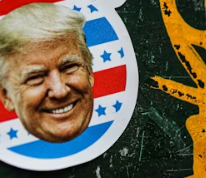$SPY $DIA #TradeWars #USPolitics #GlobalEconomy #Tariffs #ChinaUS #EconomicPolicy #TrumpAdministration #InternationalTrade #MarketImpact #Geopolitics
Will Trump’s 200% Tariff on China Secure Vital Exports? Learn How This Affects Us
In a bold escalation of trade tensions, President Donald Trump has announced a potential 200% tariff on Chinese goods if China fails to supply the United States with necessary magnets. This move comes amidst an ongoing trade truce, sparking concerns about the future of international trade dynamics and economic stability.
Understanding the Magnitude: Why Magnets?
Magnets, although seemingly inconspicuous, are critical components in various high-tech and industrial applications. They are essential in everything from electric vehicles and wind turbines to defense and consumer electronics. China’s dominance in the rare earth metals market, crucial for magnet production, places them in a pivotal position in global supply chains.
The Stakes Are High: Economic and Strategic Implications
Imposing a 200% tariff on Chinese imports would not only escalate trade tensions but also potentially disrupt the global supply chain, leading to increased costs for manufacturers and consumers alike. Such a significant tariff barrier would compel businesses to rethink their supply strategies, possibly accelerating the shift towards other Asian markets or reshoring initiatives.
Explore in-depth analyses on stock market reactions to trade policies.
Global Markets at a Crossroads
Financial markets are sensitive to geopolitical disturbances, especially those involving the world’s two largest economies. An escalation like this could lead to volatility in global stock markets as investors react to the uncertainty. Furthermore, other countries might find themselves compelled to choose sides or negotiate new trade terms, reshaping international economic relationships.
Long-term Consequences: A New Trade Paradigm?
This tariff threat could be a strategic maneuver by President Trump to secure a better trade deal with China. However, it risks long-term destabilization of global trade norms and could lead to retaliatory measures by China. The implications extend beyond immediate economic effects, potentially affecting international diplomatic relations and the future landscape of global trade agreements.
Navigating Uncertain Waters: What This Means for Investors and Policymakers
Investors and policymakers must stay informed and agile. They need to consider not only the immediate impacts of these tariffs but also the longer-term strategic shifts in global trade policies. For investors, diversifying portfolios and considering safe-haven assets might be prudent in light of increased geopolitical risks.
Conclusion: A Delicate Balance
President Trump’s tariff threat underscores the delicate balance of international trade and its broader implications on global economic stability and diplomatic relations. As the situation unfolds, it will be crucial for stakeholders across all sectors to monitor developments closely and prepare for a range of outcomes.
In conclusion, while the immediate focus might be on tariffs and trade, the broader narrative holds significant implications for global economic governance and international relations. Navigating this complex landscape will require careful analysis and strategic foresight.
Learn more about market dynamics and investment opportunities.
As we continue to monitor these developments, the intersection of geopolitics and economic strategy becomes increasingly relevant, not just for policymakers but for anyone involved in the broader economic ecosystem.











Comments are closed.